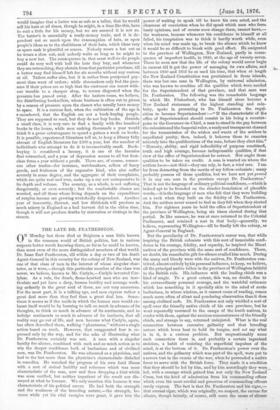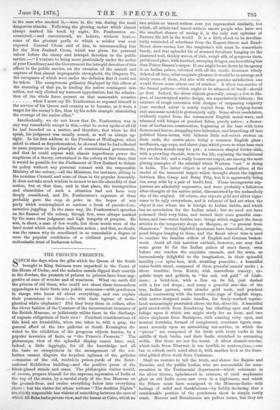THE LATE DR. FEATHERSTON.
ON Monday last there died at Brighton a man little known in the common world of British politics, but in various respects better worth knowing there, so far as he could be known, than most even of the more distinguished members of that world. Dr. Isaac Earl Featherston, till within a day or two of his death Agent-General in this country for the colony of New Zealand, was one of that class of men in the interest of whose singular char- hcter, as it were,—though this particular member of the class was never, we believe, known to Mr. Carlyle,—Carlyle invented Car- lylese. As a rule, the dumb, flame-hearted men who are inar- ticulate and yet have a deep, human lucidity and courage work- ing ardently in the great soul of them, are not very numerous. For the most part, it is a talking age, and men express rather a great deal more than they feel than a great deal less. Some- times it seems as if the mode in which the human race would ex- haust itself would be by learning to talk so much in advance of its thoughts, to think so much in advance of its sentiments, and to indulge sentiments so much in advance of its instincts, that all reality may go out of life, and men become what Carlyle, again, has often described them, walking "phantasms," without a single action based on truth. However, that exaggerated fear is ex- pressed only by the way, and for the sake of illustrating what Dr. Featherston certainly was not. A man with a singular faculty for silence, combined with such and so much action as to win the deeper confidence both of barbarians and of civilised men, was Dr. Featherston. He was educated as a physician, and had to the last more than the physician's characteristic disbelief in remedies. He watched the progress of his own fatal illness with a sort of stoical lucidity and reticence which was most characteristic of the man, now and then dropping a hint which was soon verified, but neither impatient of the result nor dis- mayed at what he foresaw. We only mention this because it was characteristic of his political career. He had both the strength and the weakness of the brooding nature,—the strength, be- cause while yet his vital energies were great, it gave him the power of waiting to speak till he knew his own mind, and the clearness of conviction when he did speak which men who form hasty opinions, and of course soon change them, cannot have,— the weakness, because whenever his confidence in himself at all failed, his temptation was to think it hardly worth while, even when his mind was made up, to break the silence which he knew it would be so difficult to break with good effect. He emigrated to the province of Wellington, New Zealand, partly in conse- quence of imperfect health, in 1840, at the age of twenty-seven. There he soon saw that the life of the colony would never begin in earnest till it got the power of managing its own affairs, and between 1840 and 1853 he so used his time, that when at length the New Zealand Constitution was proclaimed in those islands, there was but one man in Wellington, by universal admission, who was known to combine all the qualities which were needed for the Superintendent of that province, and that man was Dr. Featherston. The following was the remarkable language in which Mr: Fitzherbert, who has himself since become a New Zealand statesman of the highest standing and cele- brity, spoke in presenting to Dr. Featherston the requi- sition to become Superintendent :—" If the characteristic of the office of Superintendent should consist in his being a counter- poise to the Governor-in-Chief, a man to stand in the gap between the colonists and the Imperial ruler, a ready and transparent channel for the transmission of the wishes and wants of the settlers in unpolluted purity, then, indeed, it behoves them to examine minutely into the qualifications of the man, before they elect him." " Honesty, ability, and rigid inflexibility of purpose combined, truth and high courage, become indispensable qualities, if that view of the office of Superintendent be correct. Nor ought these qualities to be taken on credit. A man is wanted on whom the settlers know—not think—they can rely, in fact, a tried man. I am far from detracting from the merits of my fellow-colonists ; many probably possess all these qualities, but we have not yet proved it in any one man in the province except Dr. Featherston." That is not the language of ordinary political confidence,—which is indeed apt to be founded on the slender foundation of plausible words,—it is the language of men who felt that they were building on a rock when they built on the fidelity of Dr. Featherston. And the settlers never ceased to feel as they felt when they elected him. For eighteen years he held the office of Superintendent of the province of Wellington, being six times elected during that period. In like manner, he was at once returned to the Colonial Parliament, and retained a seat in that body—generally, we believe, representing Wellington—till he finally left the colony, as Agent-General in England.
But the peculiarity of Dr. Featherston's career was, that while inspiring the British colonists with this sort of immutable confi- dence in his courage, fidelity, and capacity, he inspired the Maori natives of the province with the same sort of confidence. There, no doubt, his remarkable gift for silence availed him much. During the many and bloody wars with the natives, Dr. Featherston con- trived, almost entirely by his personal influence, to keep, we believe, all the principal native tribes in the province of Wellington faithful to the British rule. His influence with the leading chiefs was a kind of magic. To a great extent, this was, no doubt, due to his extraordinary personal courage, and the watchful reticence which has something in it specially akin to the mind of acute barbarians, in whom wisdom, as it cannot come of reading, comes much more often of silent and pondering observation than it does among civilised men. Dr. Featherston not only wielded a sort of spell over the friendly native chiefs of his own province, but he went repeatedly unarmed to the camps of the hostile natives, to confer with them, against the anxious remonstrances of the friendly chiefs, and strange to say, returned uninjured. What is the real connection between excessive gallantry and that brooding nature which loves best to hold its tongue, and not say what is in it, is a curious problem. But unquestionably some such connection there is, and probably a certain ingrained stoicism, a habit of resisting the superficial impulses of the mind, is at the bottom of it. Dr. Featherston's power over the natives, and the gallantry which was part of the spell, were put to a severe test in the course of the war, when he persuaded a native force to serve with the British force. They made it a condition that they should be led by him, and by him accordingly they were led, with a courage which gained him not only the New Zealand Cross, but the kind of admiration from his commanding officer which even the most cordial and generous of commanding officers rarely express. The fact is that Dr. Featherston and his cigar,— that eternal cigar, which was originally, we suspect, the excuse for silence, though latterly, of course, still more the cause of silence in the man who smoked it,—were in the -van during the most dangerous attacks. Following the glowing ember which almost always marked his track by night, Dr. Featherston en- countered,—and encountered, we believe, without hurt,— some of the greatest perils to which a soldier was ever exposed. General Chute said of him, in recommending him for the New Zealand Cross, which was given for personal valour before the enemy and intrepid devotion to the public service :—" I venture to bring more particularly under the notice of your Excellency and the Government the intrepid devotion of this officer to the public service, on the occasion of the assault and capture of that almost impregnable stronghold, the Otapawa Pa, the occupants of which were under the delusion that it could not be taken. The conspicuous gallantry displayed by this officer at the storming of that pa, in leading the native contingent into action, not only elicited my warmest approbation, but the admira- tion of the whole force present on that memorable occasion
when I must say Dr. Featherston so exposed himself in the service of his Queen and country as to become, as it were, a target for the enemy's fire, thus by his noble example stimulating the courage of the native allies."
Intellectually, we do not know that Dr. Featherston was in any way remarkable except in this,—that he never spoke at all till he had brooded on a matter, and therefore, that when he did speak, his judgment was usually sound, as well as always up- right. In his first address to the Province of Wellington, when asked to stand as Superintendent, he showed that he had reflected to some purpose on the principles of constitutional government, and that he could expose with almost superfluous power the emptiness of a theory, entertained in the colony at that time, that it would be possible for the Parliament of New Zealand to debate its policy without any personal contact with the responsible Ministry of the colony,—all the Ministers, for instance, sitting in the nominee Council, and none of them in the popular Assembly. It does not take much wisdom in us now to see the absurdity of that notion, but at that time, and in that place, the incongruities and absurdities of such a situation had not been very deeply considered, and Dr. Featherston's exposure of them probably gave the coup de grace to the hopes of any party which contemplated so curious a freak of pseudo-Con- servative juggling. In the same way, Dr. Featherston's speeches on the finance of the colony, though few, were always marked by the same clear judgment and high integrity of purpose. He was, in short, a man of few words, but those words were of the hard metal which underlies deliberate action ; and that, no doubt, was the reason why he conciliated in so remarkable a degree at once the popular confidence of a civilised people, and the enthusiastic trust of barbarous tribes.

































 Previous page
Previous page